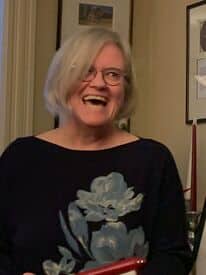Ellie O’Leary considers a staggering childhood loss
It was likely the poet’s name, but I was well into Breathe Here: Poems by Ellie O’Leary before I realized she wasn’t writing about her childhood in an Irish village. Instead, she was writing about her childhood in a Maine village. But the sense of being a part of an Irish Catholic family is so strong that I think I can be forgiven.
O’Leary writes about an array of subjects — illness (her own and others’), wildlife, childhood, and, eventually, Maine. But if there is one predominant theme, is that of loss, especially loss in childhood.
At 10 years old, O’Leary loses her mother, and it’s starkly clear how that loss staggered her and her father. When she’s 18, her father enters a veterans’ hospital, and dies there. The poems she’s written about these two deaths signal an acceptance of what’s happened, but the losses are still staggering.
We often struggle with what words of comfort we can say to the recently bereaved. A simple “I’m here” may be enough. What we might not consider is how the recently bereaved themselves might struggle with finding the words to the repeated questions they’re asked. Several of O’Leary’s poems address that struggle, and it’s especially hard for the 10-year-old girl to keep explaining to her friends and classmates why she only has one parent, and then why she has no parents.
I Would Ask Where and Why
For my mother, born October 1902, died February 1959
For my father, born January 1903, died December 1966

I wonder who does he think
he is, with all those dead people already,
when I’m not done with her yet.
I would ask her where she went,
but I can’t because she is gone from life
while stray cats, the lilacs in front,
and even our house, remain.
I get tired of thinking it, adjusting,
explaining I only have my father
because my mother is dead.
I can’t ask him because
he won’t really talk about it.
Eight years on, once I’ve seen
my friend’s parents can be in the hospital
then come home, my father is admitted
to Togus Veterans Hospital and dies.
I would ask why but I don’t bother.
I just say ten and eighteen,
Natural causes, each of them.
When I was ten; then I was eighteen.

Ellie O’Leary
Death is more easily understandable when we’re old, but far less so when we’re children. And that child asks a perfectly sensible question when told God wanted her mother. Didn’t he already have enough dead people? Why did he need one more? She sees more clearly when her father dies, but it still doesn’t make sense. Other parents go into the hospital and do just fine; her one remaining parent goes in and doesn’t.
O’Leary grew up in the village of Freedom, Maine. She received a Master of Fine Arts degree in the University of Southern Maine’s Stonecoast program, and she’s hosted a radio program, taught poetry, and organized a writing program at an Adirondacks retreat center. She currently lives in Amesbury, Massachusetts, where she is poet laureate. She is also education director for the Gloucester Writers Center. Her memoir, Up Home Again, was published in February.
The title poem of the collection, “Breathe Here,” contains its own advice on what to do when faced with the inexplicable. Sometimes it’s sufficient simply to breathe: “I’m here / trying, breathing, / not home saying / I can’t do this…” And Ellie O’Leary continues to breathe.
Photo by Pai Shih, Creative Commons, via Flickr. Post by Glynn Young.
How to Read a Poem uses images like the mouse, the hive, the switch (from the Billy Collins poem)—to guide readers into new ways of understanding poems. Anthology included.
“I require all our incoming poetry students—in the MFA I direct—to buy and read this book.”
- Poets and Poems: Sandra Marchetti and “Diorama” - April 24, 2025
- Poets and Poems: Christina Cook and “Roaming the Labyrinth” - April 22, 2025
- Longfellow’s “Paul Revere’s Ride”: Creating a National Legend - April 17, 2025


Ellie O'Leary says
Thank you for your kind words.
Tomra Vecere says
“while stray cats, the lilacs in front…” yes, life just goes on! Well done Ellie
Bethany R. says
“I’ve seen
my friend’s parents can be in the hospital
then come home”
Katie Spivey Brewster says
“What to do when faced with the inexplicable: breathe, try.”
My attempt to paraphrase your closing statement, Glynn.
I look forward to reading Ellie’s memoir.
Gratefully,
Katie